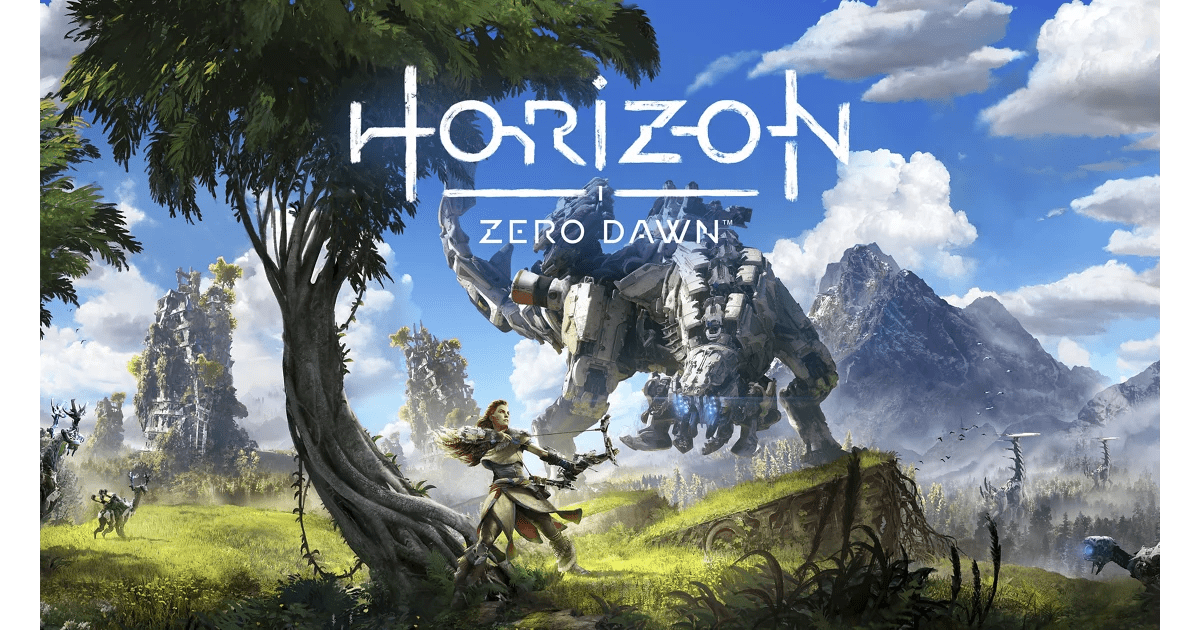The game I played for this week’s critical play is Horizon Zero Dawn. Horizon Zero Dawn is an action RPG developed by Guerilla Games. The director is Mathijs de Jonge. The game is available on PC and PS4, I played the game on PC. The target audience for this game are players who enjoy RPGs, great combat, and open world games. My playtime on the game is about 3 hours at the time of writing this, so I’ve only seen the beginning of the narrative (this game is 30 hours long).
Horizon Zero Dawn challenges traditional notions of femininity, most prominently through the game’s protagonist, Aloy. I’ve noticed that while there are many indie games with diverse characters and creative feminist stories, most AAA games in this genre still feature traditional male hero protagonists and primarily cater to a masculine audience. Although these games do often feature women in prominent roles, these roles often reinforce traditional gender stereotypes. For example, women are often depicted as damsel in distress to be saved by the hero (e.g., Mario, Zelda), or as targets for romance (e.g., every single JRPG). Furthermore, many games today tend to over-sexualize female characters with unrealistic “breast physics” or skimpy outfits that lead to objectification of women (e.g., Tomb Raider, every single JRPG). Horizon Zero Dawn challenges these stereotypes, by starring Aloy as the main character, a strong, independent, and compassionate hunter who fights robot dinosaurs through various techniques like combat and stealth. These harmful gender stereotypes are largely absent from Horizon Zero Dawn, instead the game seeks to tell a meaningful narrative and provide a great open world action experience typical of the best games in the genre. As Shira Chess writes in her book, games today are masculine because they are developed predominantly by male developers for a male audience, leading to “cultural inaccessibility” for female players, who become less likely to play games, get into the industry, and change the content or style of games. By starring Aloy and providing representation for women in games that are not defined by traditional stereotypes, importantly in a big budget AAA game that gets lots of coverage, Horizon Zero Dawn makes gaming more welcoming to women and feminist players. This provides an entry point for feminist players to engage with the gaming industry and “destroy” it, as Chess puts it, to create more equality in play.
Horizon Zero Dawn also tells a good feminist story. I’ve only played the beginning of the game, but these first few hours of the game already have considerable emotional depth. The beginning of the game follows Aloy’s life as she grows up with her adoptive father. We play as Aloy as a kid learning to shoot a bow and kill robots for the first time together with her father, until she eventually grows up and becomes a powerful hunter. At the end of the first arc, Aloy takes part in the Proving, where she gets the chance to return to the tribe but has to part ways with her adoptive father with whom she has a deep emotional connection. The considerable amount of time that the game spends on Aloy’s coming-of-age story instead of rushing right into the action with grown-up Aloy helps to flesh out Aloy’s character and allow the players to build empathy with her, thus telling a robust story with feminist appeal.
Horizon Zero Dawn also incorporates agency in its mechanics. Notably, the game features many dialogues or story moments between Aloy and various characters in the world. In these moments, the player can often choose the action or dialogue that they want Aloy to do with different consequences. For example, the player may choose to resolve a situation either with violence or with forgiveness. These choices provide players with the sense of agency, that they have the power to act and influence the story in the way that they want to, instead of following a predetermined path. Another area where agency comes into play in Horizon Zero Dawn is the combat. In the game, Aloy is able to face the machine enemies in many different ways. She can fight the machines head on with raw strength, utilize stealth to take out opponents silently, or use clever techniques such as placing wire traps along the machine’s paths. The flexibility of combat options empowers players to choose the way they want to play the game on their own accord and exert their agency, thus training players to be better feminists.

Discussion question
How can games utilize feminist perspectives beyond simply more representation? Especially, how can AAA games do this? Is it harder for AAA games to incorporate feminist perspectives than indie games (because, presumably, the need for the game to turn a profit and cater to a masculine audience)?




